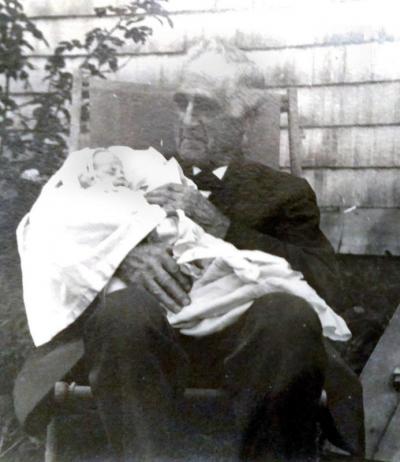Historical society: here's why Job Gidley was a saint
Job Gidley rode around Dartmouth on a white horse, except when he was teaching Russian refugees to farm in Canada.
For the man who served the town as a selectman, led discussions with his fellow Quakers, and advocated for religiously persecuted peoples, the white horse symbolizes something more than a mode of transportation.
[Related: How Job Gidley handled immigration in the late 1800s]
Dartmouth Historical & Arts Society President Bob Harding explained that, in many texts, a white horse carries a saint at the end times. Harding explained that Gidley — who was so influential for the Town of Dartmouth and the Quaker community — made a pact with God at a young age after falling very ill. He promised a holier lifestyle upon recovery, said Harding at the March 12 DHAS meeting.
Harding gave his lecture on Gidley’s life and genealogy to a 22-person crowd at the 1871 Schoolhouse. Here’s why Gidley was nothing short of a saint, according to Harding.
The speaker.
Gidley travelled as far as Ohio to speak, and would speak in both meeting houses and on various topics of interest.
"He was a very eloquent speaker, and very bright. He was invited all over the country to speak," said Harding. Gidley also spoke and taught at Providence Friends School.
Harding noted that Gidley was "awake and aware of his world." A well-read man, he could "recite any poem you could name," said Harding. Gidley was known for breaking up slow lectures with poetry in the meeting houses.
Being a farmer, Gidley was qualified to talk about farming practice, and used his expertise to train a group of Russian refugees how to farm in Nova Scotia.
"He had a lot of cows, and had a lot to talk about," said Harding, showing documents that listed Gidley's presentation on milk production. Gidley was also a charter member of the South Bristol Farmers' Club.
The town moderator.
Gidley served Dartmouth's school system as a teacher, administrator, and school committeeman before resigning in 1890. He spent 26 years as the School Committee Chairman, said Harding.
"He was the longest standing member of the School Committee," added attendee Sue Guiducci. "Thirty-five years."
He also served as moderator for Town Meeting, selectman, town clerk, and town assessor.
When Town Meeting would get too crowded, people would line up outside. They'd open the windows, and people could hear Gidley without a microphone, said Harding.
Gidley is described as speaking in "stentorian tones" in newspapers at the time.
The advocate.
The Quakers were persecuted in Sandwich, so a lot of them relocated to Dartmouth. Dartmouth also hosted Quaker transplants from Portsmouth, Rhode Island, said Harding. Gildey's family, however, landed in Boston after moving from England, and then relocated to Dartmouth.
In 1899, Gidley took a yearlong sabbatical and used it to support a refugee group from Russia, the Doukhobors. A newspaper clipping describes the event: "[Joseph Elkinton and Job Gidley] are Quakers, and have the quaint costume and speech of the brethren. They have taken great interest in the Doukhobors...."
Harding explained that the "speech" which the paper refers to means the men spoke with the "thy's" and the "thou's."
"It's unbelievable the accomplishments of one person without the modern day conveniences. What an inspiration," said attendee Pat Regan.
The Dartmouth Historical & Arts Society will continue its lecture on Gidley on April 9, when it discusses his namesake, Gidley School. The public is welcome to attend. For more information on Gidley, visit DartmouthHAS.org.













